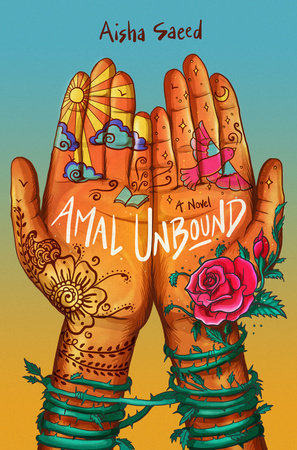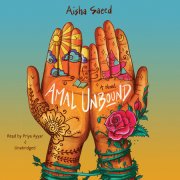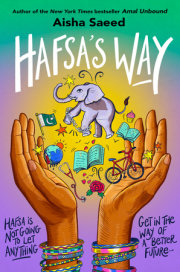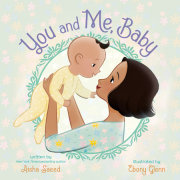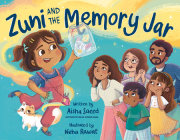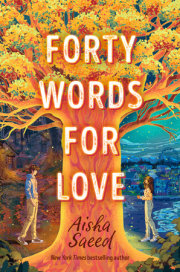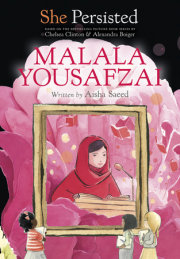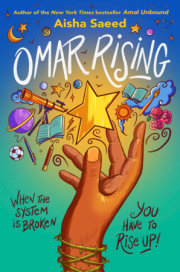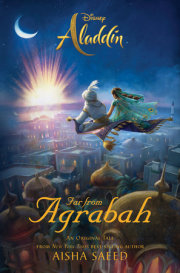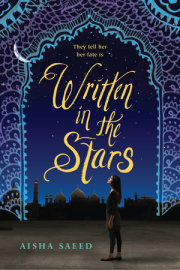Chapter 1 I watched from the window as the boys tumbled out of the brick schoolhouse across the field from us. Our class was running over. Again.
Girls shifted in their seats and snuck glances at the clock above the chalkboard. My friend Hafsa sighed.
“And finally, I have some bad news,” Miss Sadia told us. She picked up a stack of papers from her desk. “I finished grading your math tests. Only five of you passed.”
The class let out a collective groan.
“Now, now,” she hushed us. “This just means we have more work to do. We’ll go over it tomorrow and take another test next week.”
“Those questions were hard,” my younger sister Seema whispered to me. We lined up by the chalkboard at the front of the class to get our tests. “I should’ve stayed with the younger class until fall.”
“Oh, come on. You know you probably passed,” I whispered back. “When have you ever failed an exam?”
Seema tugged at her sleeves as she walked up to Miss Sadia. It was only in the arms that you could see my old uniform was too big on her. Miss Sadia handed Seema the paper. As expected, Seema’s worried expression shifted to a smile. Her steps were lighter before she slipped out of the classroom.
“I’m sorry I can’t help today,” I told Miss Sadia once the room was empty. This was my favorite part of the day, when everyone left and it was just the two of us. The building felt like it had exhaled, expanding a little bit without all thirty-four of us, crammed two to a desk, filling up nearly every square inch of space. “My mother is in bed again.”
“Is the baby almost here?”
“Yes, so my father said I have to come home and watch my sisters.”
“I’ll miss your help, Amal, but he’s right; family comes first.”
I knew helping family was what a good eldest daughter did, but this time after school with Miss Sadia wasn’t just fun; it was important. I wanted to be a teacher when I grew up, and who better to learn from than the best teacher I ever had? I loved washing the chalkboards, sweeping the floor and hearing stories of her college days. I loved watching her go over her lessons and rework them based on what worked and what didn’t the day before. I learned so much from watching her. How could my father not understand?
“I could still use your help with the poetry unit next week,” she told me. “Some of the students are grumbling about it. Think you could convince Hafsa to give it a chance? You know how she rallies the others to her side. She’ll listen to you.”
“I don’t think she minds reading the poems. Writing them makes her nervous.”
“You’d think everyone would be happy to write poetry! Shorter than an essay.”
“It’s different. The great poets like Ghalib, Rumi, Iqbal—they had things to say.”
“And don’t you have things to say?”
“What would I write about?” I laughed. “My little sisters? My father’s sugarcane fields and orange groves? I love reading poems, but there’s nothing for me to really write about. Our life is boring.”
“That’s not true! Write about what you see! Write about your dreams. Pakistan was founded by the dreams of poets. Aren’t we of the same earth?”
Miss Sadia’s dramatic way of talking was one of the reasons I loved her, but I wasn’t convinced. It’s not that I wasn’t proud of my family and our life. I was lucky to belong to one of the more prosperous families in our Punjabi village but it didn’t change the fact that I lived in a village so tiny, it didn’t even register as a dot on a map.
But I promised I’d talk to Hafsa.
This is what I now remember most about my last afternoon at school—the smell of the dusty chalkboard, the sound of the students lingering outside the door, and mostly, how easily I took my ordinary life for granted.
Chapter 2 I raced down the school’s gravel walkway to catch up to Seema and Hafsa. The sun blazed overhead, warming my chador and my hair beneath it.
“I’m buying Miss Sadia one of those bells I see on TV. You know, the kind that rings when class is over?” Hafsa grumbled.
“She doesn’t always keep us late,” I protested.
“Remember last week?” Hafsa said. “How she went on and on about constellations? By the time I got home, my brothers were out of their school clothes and halfway through their homework.”
“But wasn’t it interesting?” I asked. “The way the night stars help us when we’re lost and tell all sorts of different stories?”
“Why do I need to know about connecting dots in the sky? I want to be the first doctor in my family. Not the first astronaut,” Hafsa said.
Hafsa and I had been friends so long, I couldn’t remember a time I didn’t know her, but when she talked like this, I didn’t understand her at all. Unlike Hafsa, I wanted to know everything there was to know. How fast did airplanes fly? Why did some leave whiffs of clouds in their wake and others didn’t? Where did ladybugs go when the rain came hard and fast? What was it like to walk through the streets of Paris, or New York, or Karachi? There was so much I didn’t know that even if I spent my whole life trying, I knew I could only learn a small percentage of it.
“How’s your mom?” Hafsa asked. “My mother said her back is hurting.”
“It’s gotten worse,” I told her. “She couldn’t get out of bed yesterday.”
“My mother said that’s a good sign. Backaches mean a boy,” Hafsa said. “I know that would make your parents happy.”
“It would be fun to have a brother,” I said.
“There it is! Look at the door!” Hafsa said when we turned the bend toward our homes. She pointed to the building that had appeared next to our village mosque. A structure had never emerged quite like this before with no explanation. Two weeks ago, a concrete foundation had been poured onto the field where we played soccer. The next week, brick walls arose and windows appeared, and today there was a door—painted lime green!
“Any idea yet what it could be?” I asked her.
“Yes.” Hafsa grinned. If Hafsa could have it her way, she’d be permanently stationed by the crates of fruit at her family’s market, soaking up every bit of gossip. “Khan Sahib is building a factory.”
I rolled my eyes. Rumors and gossip were a part of life in our village. Some of the talk was ordinary, about the state of the crops or the weather, but often it centered on Khan Sahib, our village’s powerful landlord.
“Why would he build a factory here? He has plenty in Islamabad and Lahore,” Seema said. What we need is a clinic. Look how much Amma’s back hurts. The doctor in town is good, but this village needs a proper clinic.”
“Do you really think Khan Sahib would put up anything to help us?” Hafsa scoffed.
“Maybe it’s not him building it,” I suggested.
“Look at the fancy green door! Who else has time and money to waste like that? You know I’m right.”
Any unexplainable situation was always pinned to Khan Sahib. He was the mysterious figure I’d heard of all my life but never seen. When I was younger, he loomed large and scary, like a character in a horror story.
“Sure! He’s the one who breathes fire when he talks, right?” I rolled my eyes.
“Didn’t he pick all the fruit off Naima’s guava tree?” Seema winked.
“I heard he’s why we’ve had no rain for months,” I continued.
“I don’t decide what I hear,” Hafsa huffed. “I just report it.”
“We’ll find out what it is soon enough.” I hooked my arm through Seema’s. “But in the meantime, let’s hope it’s a clinic.”
Hafsa’s house came first on our path, just past the post office. Then came mine. I saw it in the distance. Gray like the others surrounding it except for the roses my mother planted around its border just before I was born; they still bloomed each spring around this time, without fail. It’s why spring was my favorite time of year.
My friend Omar peddled past us in his blue and khaki school uniform. He chimed his bell three times, our signal to meet. The stream. That’s the direction he was headed in.
“Oh no.” I looked in my book bag. “I left my exam in class.”
“Again?” Hafsa frowned.
“Tell Amma I won’t be long?” I asked Seema.
Seema hesitated. Our father would be home soon, but she knew Omar didn’t chime his bicycle bell three times unless it was important.
“Okay.” Seema nodded. “Hurry.”
Copyright © 2018 by Aisha Saeed. All rights reserved. No part of this excerpt may be reproduced or reprinted without permission in writing from the publisher.

